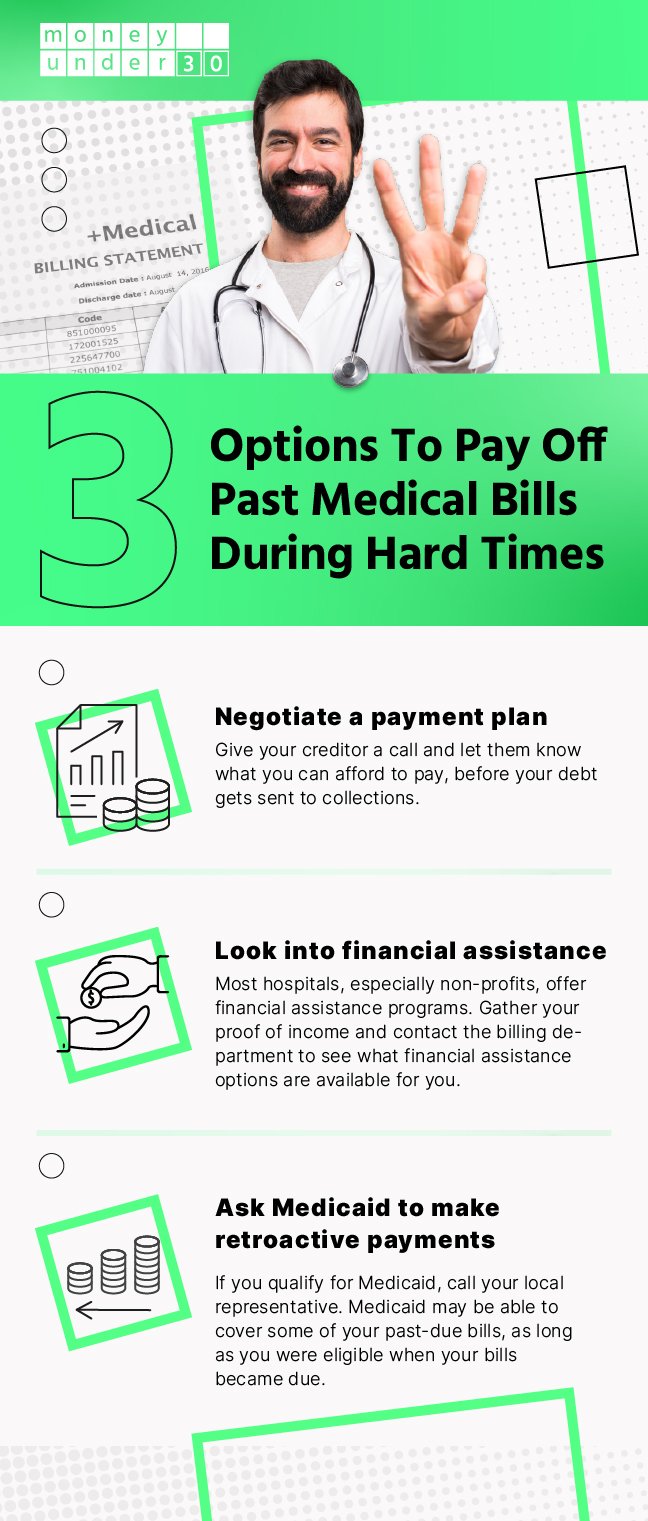You’re young. You’re healthy. But that doesn’t mean you won’t have a medical emergency tomorrow and get stuck with some whopping bills. These bills can get overwhelming really fast and it can be tempting to just ignore them.
But let’s be clear here — you do have to pay them. According to the Consumer Financial Protection Bureau, medical debt is the most common type of debt collection found on consumers’ credit reports.
If you get slapped with a big hospital or doctor’s bill, make sure you follow these steps.
Make sure the charges are accurate
One reason why medical care is so expensive? The system is kind of a mess and they make a lot of billing mistakes.
Some of the most common include charges for services you didn’t receive and medications you never took. If you have an extended hospital stay, sometimes you’ll get charged a full day’s room rate even if you check out in the morning.
Here’s how to fix mistakes on your credit.
Don’t ignore your bills
This point bears repeating. Whatever you do, don’t ignore your bills — it’s one of the worst things you can do. If you do, your bills eventually will be sent to collections, and not only will you get annoying phone calls, but your credit score will take a hard hit.
Don’t use credit cards to pay off your medical bills
If you have what seems like never-ending medical bills, you might be tempted to pay them off in full with credit cards to get your doctor(s) off your back. But you should never use credit cards to pay off your medical bills.
As we’ve said in many of our posts before, carrying a balance on your credit card can lead to a never-ending cycle of debt due to high-interest payments. This can have a very negative effect on your credit score.
There’s more room to negotiate medical bill payments, unlike some other debts. As long as you pay something, and set up a payment plan, you can get by making smaller payments for a while. Medical payments also come with low or no interest, which is definitely not something you’ll get with other types of debt.
Work out an interest-free payment plan
One thing I learned when I was dealing with a huge hospital bill is that interest-free payment plans exist, but “it’s often written in the fine print on the statement,” says Marcy Quattrochi, manager of Financial Counseling at NorthShore University HealthSystem.
Depending on the hospital or doctor’s office, the amount you pay each month may be negotiable. They’ll start out with a number that may be too much for you. Don’t be afraid to talk them down.
Ask for a prompt pay discount

Some hospitals and doctor’s offices will give you a one-time discount for paying your bill in one lump sum within 30 days. “We take 10% off,” Quattrochi says.
Some experts suggest asking for even more of a discount. You can get some ammunition for your argument by using the Healthcare Blue Book to see what other nearby hospitals or doctors charge for the type of care you received. If you were charged significantly more, you can argue you deserve a price reduction.
Apply for financial assistance
If you can’t afford to pay anything at all, then I suggest applying for financial assistance.
Luckily, most hospitals offer this option, but each has its own procedure. At some, you have to apply for Medicaid first (you may be eligible if you are under 26 and earn less than $15,856). If you’re rejected, then you apply for help from the hospital.
Other hospitals have an easier process, but it still requires a lot of paperwork.
“We have an application that you must complete along with giving us your tax returns, bank account information, and paychecks,” Quattrochi says. “After we review that, we determine a discount.”
Here’s a list of 35 other medical assistance programs that can help you get your medical bills covered.
Apply for a loan
Getting a loan should be a last resort because if you can’t pay it off, you’ll be on the hook for the APR. That said, you’d be paying less in interest than you would if you had a balance on a credit card, which is why we’re recommending you consider this option.
Deal with collection agencies
If the worst has happened and your bills have gone to a collections agency, you need to deal with it. Luckily, internal collections agencies (those at the hospital or doctor’s office) are more willing to negotiate payment plans and hold off sending information to credit bureaus than third-party debt collectors.
Here are a few tips to help make dealing with collection agencies a little less painful:
Know what collectors can do
Believe it or not, debt collectors can’t call you an unreasonable number of times (including before 8 am or after 9 pm).
They also can’t:
- Report your medical debt to the credit bureaus if it’s been less than a year since it was handed over to them.
- Report medical debts under $500 to the credit bureaus.
- Call you at work if you’ve asked them not to.
- Threaten to sue you without significant reason.
- Tell you that you have committed a crime by not paying.
- Threaten to tell others about your debt (except for your lawyer or spouse.)
- And more.
Record any phone calls and get everything in writing
Talking with debt collectors can get heated quickly, but they aren’t allowed to threaten you. If they do, you have reason to sue. So make sure to record your phone calls with any debt collectors that contact you.
Once you’ve come to an agreement on what you can pay, make sure you get it in writing. Don’t make any payments until you have the physical document.
Also, keep all proof of payment — that way, if there’s ever a question about your debt you can prove that you paid what you said you would.
Offer to pay something
Obviously debt collectors want to get the full debt paid, but be firm and offer to pay what you can. It’s likely that they’ll accept it.
You should expect a counteroffer — or a couple of them. That, after all, is what debt collectors are supposed to do.
If you can pay off the debt in full, this will look much better on your credit report, but chances are you can’t — which is how you got in the situation in the first place. Just offer to pay what you can.
Summary
It can be tempting to ignore medical bills since there’s no immediate repercussion like there is when you don’t pay your mortgage or credit card bill.
But like any business, hospitals and medical offices eventually turn over unpaid bills to collection agencies. And once they get involved, your credit score could take a hit for up to seven years and negotiation gets a whole lot harder.


